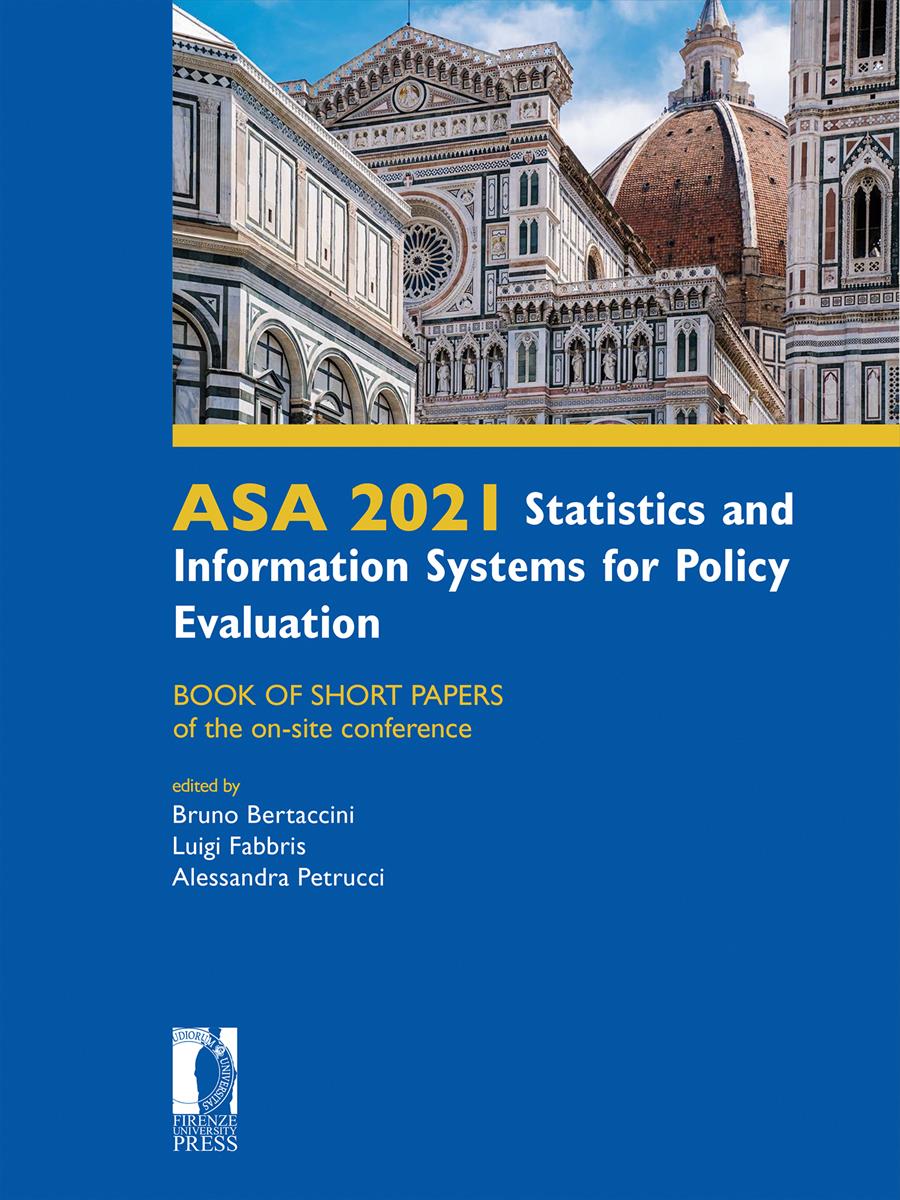- ASA 2021 Statistics and Information Systems for Policy Evaluation
- Edited by Bruno Bertaccini, Luigi Fabbris, Alessandra Petrucci
A statistical information system in support of job policies orientation
- Adham Kahlawi
- Francesca Giambona
- Lucia Buzzigoli
- Laura Grassini
- Cristina Martelli
- © 2021 Author(s) |
- CC BY 4.0
- DOI: 10.36253/978-88-5518-461-8.25
A significant problem for labour market policies relies on the individuation of the most advisable skills to have and to enhance through focused training offers. Vocational training systems and institutions are called to answer the question posed by every person looking for a new job or professional opportunities: which are the skills-to-have to enhance the professional profile? Many efforts have been made to answer this question, mainly designing predictive models; however, these models are often limited to specific economic sectors and usually don’t adopt a country-specific perspective. This paper proposes a recommendation system oriented to specific users: once that the user has described his/her skills profile, the system suggests the skills that, once got, will fit with the most frequent job vacancies. In this proposal perspective, the skills are proposed regardless of the economic sector, and they are compatible with the characteristics of the specific country labour market. In this contribution, we will focus on the Italian market; the recommendation system is based on the job ads published by Italian companies on various websites for both 2019 and 2020 after the skills required for each job offer have been mapped to one of the skills presented in the classification of European Skills/ competence, qualifications ad Occupations (ESCO).
- Keywords:
- job policies,
- labour market,
- skills recommender,
- recommendation system,
University of Florence, Italy - ORCID: 0000-0003-4040-5590
University of Florence, Italy - ORCID: 0000-0002-1760-2062
University of Florence, Italy - ORCID: 0000-0003-3297-1023
University of Florence, Italy - ORCID: 0000-0003-4678-6507
University of Florence, Italy
- Al-Otaibi S.T. and Ykhlef M. (2012), A survey of job recommender systems, International Journal of the Physical Sciences, 7(29), pp. 5127-5142.
- Chen R., Hua Q., Chang Y-S., Wang B., Zhang L., Kong X. (2018), A Survey of Collaborative Filtering-Based Recommender Systems: From Traditional Methods to Hybrid Methods Based on Social Networks, IEEE, 6, pp.64301-64320.
- Giabelli A., Malandri L., Mercorio F., Mezzanzanica M. and Seveso A., (2021), Skills2Job: A recommender system that encodes job offer embeddings on graph databases, Applied Soft Computing Journal 101, pp.107049.
- Jariha P. and Jain S.K. (2018), A state-of-the-art Recommender Systems: an overview on Concepts, Methodology and Challenges, Proceedings of the 2nd International Conference on Inventive Communication and Computational Technologies (ICICCT), pp. 1769-1774.
- Kahlawi A., (2020), An Ontology Driven ESCO LOD Quality Enhancement, International Journal of Advanced Computer Science and Applications (IJACSA), 11(3).
- Koren J., Bell R. and Volinsky C. (2009), Matrix Factorization Techniques For Recommender Systems, IEEE COMPUTER, 42(8), pp. 30-37.
- Lakshmikanth P, P. Radha K, J. V. R. M, (2021), Approaching the cold-start problem using community detection based alternating least square factorisation in recommendation systems, Evol. Intel. 14, pp. 835–849.
- Leskovec J., Rajaraman A., Ullman J. (2019), Mining of Massive Datasets, 3rd Edition, Cambridge University Press.
- Martin P M., (2015), Activation and active labour market policies in OECD countries: stylized facts and evidence on their effectiveness, IZA Journal of Labor Policy 4(4).
- Mohla D., (2020), IEEE IAS Standards-A Pathway to Narrow the Technical Skills Gap [Standards News],in IEEE Industry Applications Magazine, 26(5), pp. 94-95.
- Ras E., Wild F., Stahl C., Baudet A., (2017), Bridging the skills gap of workers in Industry 4.0 by human performance augmentation tools: Challenges and roadmap, Proceedings of the 10th International Conference on PErvasive Technologies Related to Assistive Environments, pp. 428-432.
- Tavakoli M., Mol S.T. and Kismih G. (2020), Labour Market Information Driven, Personalized, OER Recommendation System for Lifelong Learners, Proceedings of the 12th International Conference on Computer Supported Education (CSEDU), 2, pp. 96-104.
- Valverde-Rebaza J., Puma R., Bustios P. and Silva N.C. (2018), Job Recommendation based on Job Seeker Skills: An Empirical Study, In: A. Jorge, R. Campos, A. Jatowt, S. Nunes (eds.): Proceedings of the Text2StoryIR’18 Workshop, Grenoble, France.
- Varanasi B., (2021), Knowledge Obsolescence and the Future of Work: Relevance of Knowledge and Impact to Jobs, Computational Thinking for Problem Solving and Managerial Mindset Training. IGI Global, pp.64-181.
Chapter Information
Chapter Title
A statistical information system in support of job policies orientation
Authors
Adham Kahlawi, Francesca Giambona, Lucia Buzzigoli, Laura Grassini, Cristina Martelli
Language
English
DOI
10.36253/978-88-5518-461-8.25
Peer Reviewed
Publication Year
2021
Copyright Information
© 2021 Author(s)
Content License
Metadata License
Bibliographic Information
Book Title
ASA 2021 Statistics and Information Systems for Policy Evaluation
Book Subtitle
BOOK OF SHORT PAPERS of the on-site conference
Editors
Bruno Bertaccini, Luigi Fabbris, Alessandra Petrucci
Peer Reviewed
Publication Year
2021
Copyright Information
© 2021 Author(s)
Content License
Metadata License
Publisher Name
Firenze University Press
DOI
10.36253/978-88-5518-461-8
eISBN (pdf)
978-88-5518-461-8
eISBN (xml)
978-88-5518-462-5
Series Title
Proceedings e report
Series ISSN
2704-601X
Series E-ISSN
2704-5846
